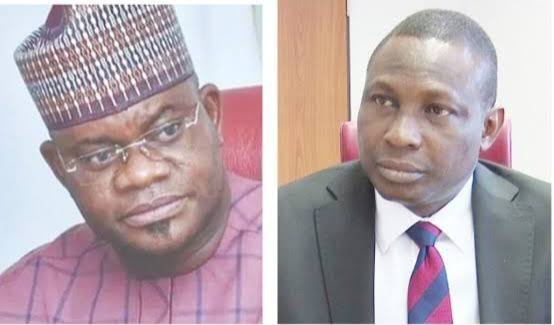The Chairman of the Economic and Financial Crimes Commission (EFCC), Ola Olukoyede, has made a bold declaration, stating that he will tender his resignation if he does not personally oversee the completion of the investigation into former Kogi State Governor, Yahaya Bello.
The EFCC Chairman disclosed that he made a direct phone call to Yahaya Bello, out of respect, urging him to appear before the commission to address the charges against him. Unfortunately, the former Kogi governor declined the invitation.

The EFCC chairman disclosed this in a chat with journalists at the EFCC Headquarters in the Jabi area of Abuja on Tuesday.
Olukoyede emphasized the importance of Nigerians supporting the EFCC in its efforts to combat corruption, stating that the agency’s failure would reflect negatively on the country as a whole.
He highlighted the positive impact of the EFCC’s ongoing efforts, which have contributed to the appreciation of the Naira and improved the foreign market.
The EFCC is seeking to arraign Bello on 19 counts of alleged money laundering, breach of trust, and misappropriation of funds totaling N80.2 billion. Olukoyede vowed to prosecute Bello to a logical conclusion and bring to book all those who obstructed his arrest.
He reiterated that the EFCC will not relent in its efforts to sanitize the country, despite any attacks or obstacles.
Meanwhile, the EFCC on Tuesday served a copy of the charge sheet of alleged fraud to the tune of N84 billion against the immediate past governor of Kogi State Yahaya Bello on his lawyer, Abdulwahab Mohamed SAN.
Justice Emeka Nwite made the order following the submission of lead counsel for the Economic and Financial Crimes Commission EFCC Dr Kemi Pinheiro SAN that Bello has not show up despite the order of court compelling Bello to appear.
Pinheiro then prayed the court to direct his lawyer to accept the service of the charge on behalf of the defendant.
Relying on section 384 (4 and 5) of the Administrative and Criminal Justice Act 2015, Justice Nwite direct the counsel to the immediate past governor to receive a copy of the charge.
The court held that where it had become impossible to effect personal service of a legal process on a defendant, such could be done through substituted means.
Justice Nwite further held that it was clear that the former governor failed to appear in court for his arraignment.
Although Bello’s lawyer, Mohammed, initially declined to accept the charges and proof of evidence, he was compelled to do so by Justice Nwite.
The judge rejected the plea by the senior lawyer that a junior lawyer in his team, AI Musa, be the one to accept the charges on behalf of the former governor.
A member of the legal team for Bello, Adedayo Adedipe, SAN told the court that his client would have made himself available, but was afraid of being of a lack of fair hearing and justice.
He added that Bello was ready to appear before the court to answer the 19-count charge preferred against him by the EFCC.
Adedipe urged the court, to set aside the ex-parte order of arrest it had earlier issued against the former governor, saying that at the time the order of arrest was made, the charge had not been served on his client.
Bello had argued that the EFCC was an illegal organisation. According to him, the Federal Government did not consult the 36 states of the federation before enacting the EFCC Act through the National Assembly. He added that section 12 of the 1999 Constitution as amended, required the various Houses of Assembly to ratify the act before it could become operative.






